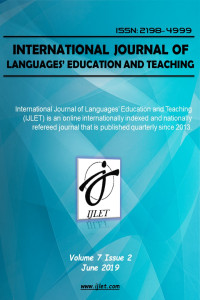Öz
Bu araştırmada, kelime öğretiminde sistematik bir ölçme değerlendirmenin olup olmadığını tespit etmek, varsa bu faaliyetin
öğretim içeriği ile örtüşme düzeyini belirlemek amaçlanmıştır. Bu çerçevede önce 5, 6, 7 ve 8. sınıf Türkçe ders ve çalışma
kitaplarında doğrudan belirli kelimeleri öğretmenin amaçlandığı tanım, eş anlam, zıt anlam, eş seslilik, temel anlam, mecaz
anlam ve terim anlamla ilgili etkinliklerdeki söz varlığı unsurları belirlenmiştir. Daha sonra belirlenen bu söz varlığı
unsurlarına göre dinleme/izleme, konuşma, okuma ve yazma etkinlikleri, tema sonu değerlendirme soruları, okuma ve
dinleme/izleme metinleri ile Türkçe dersinde yapılan her sınıf düzeyinde 25 olmak üzere toplamda 100 sınav kâğıdı
incelenmiştir. Son olarak sınav kâğıtları incelenen 20 öğretmenin kelime öğretimi bakımından ölçme değerlendirmeye ilişkin
görüşleri alınmıştır. Verilerin analizi sonucunda elde edilen bulgular şöyledir: Ders ve çalışma kitapları ile Türkçe dersi
sınavlarında hedef söz varlığı unsurlarının çok küçük bir bölümünün ölçüldüğü, söz varlığına ilişkin sorularda ders içeriği
yerine dilin genel söz varlığının dikkate alındığı tespit edilmiştir. Görüşme sonuçları da öğretmenlerin büyük bir bölümünün
kelime öğretiminde ölçme ve değerlendirmeyi bir gereklilik olarak gördüğünü, ancak bu konuda sınıf içi uygulamalara
yeterince yer vermediğini göstermektedir. Bu bulgular ışığında kelime öğretiminde öğrencilerin hedef söz varlığı unsurlarına
ilişkin bilgi ve becerilerini değerlendirmeye yönelik amaçlı ve düzenli bir uygulamanın olmadığı, dolayısıyla kelime
öğretiminde ölçme ve değerlendirmenin ihmal edildiği sonucuna ulaşılmıştır.
Anahtar Kelimeler
Kaynakça
- Ağın Haykır, H., Kaplan, H., Kıryar, A., Tarakcı, R., & Üstün, E. (2017). Ortaokul Türkçe 5 ders kitabı. İstanbul: Millî Eğitim Bakanlığı.
- Aslan, T. (2013). 7. sınıf öğrencilerinin Türkçe ders kitaplarındaki anlamını bilmedikleri kelimelerden hareketle söz varlığını geliştirmelerine yönelik bir araştırma. Yüksek Lisans Tezi, Gazi Üniversitesi Eğitim Bilimleri Enstitüsü, Ankara.
- Bozkurt, B. Ü., & Canlı, S. (2017a). İlköğretim Türkçe 6. sınıf ders kitabı. Ankara: Başak.
- Bozkurt, B. Ü., & Canlı, S. (2017b). İlköğretim Türkçe 6. sınıf öğrenci çalışma kitabı. Ankara: Başak.
- Bozkurt, B. Ü., & Canlı, S. (2017c). İlköğretim Türkçe 6. sınıf öğretmen kılavuz kitabı. Ankara: Başak.
- Butler, A. C., & Roediger, H. L. (2007). Testing improves long-term retention in a simulated classroom setting. European Journal of Cognitive Psychology, 19(4/5), 514–527.
- Çetinkaya, Z. (2002). İlköğretim ikinci kademe altıncı sınıfta ana diline ait sözcüklerin öğrenilmesi ve kavranılmasına ilişkin bir araştırma. Yüksek Lisans Tezi, Çanakkale Onsekiz Mart Üniversitesi Sosyal Bilimler Enstitüsü, Çanakkale.
- Çiftçi, Ö., & Çeçen, M. A. (2010). İlköğretim 6-8. sınıf Türkçe ders kitaplarındaki metinlerin anlamı bilinmeyen sözcükler açısından değerlendirilmesi. L. Subaşı Uzun & Ü. Bozkurt (Ed.), Türkçe öğretiminde güncel tartışmalar (s. 122–136) içinde. Ankara: Ankara Üniversitesi.
Öz
In this study, it is aimed to determine whether there is a systematic measurement and assessment in vocabulary instruction, and
the level of overlap with the content of this activity. Within this framework, initially, the vocabulary items concerning with
definitions, synonyms, antonyms, homonyms, literal meanings, metaphors and terms activities aimed to teach individual word
directly in 5, 6, 7 and 8th grade Turkish coursebooks were identified. After this, according to the target vocabulary,
listening/monitoring, speaking, reading and writing activities, questions at the end of unit assessment, reading and
listening/moritoring texts and a total of 100 exam paper, including 25 exam paper at each grade level were examined. Lastly,
the opinions of the 20 teachers about the assessment whose exam papers were examined were taken. The findings obtained
from the analysis of the data are as follows: It was determined that a very small part of the target vocabulary elements were
measured in the coursebooks exercise book, and Turkish course exams, the general vocabulary of the language instead of course
content was taken into consideration in the questions related to the vocabulary. The results of the interviews revealed that
although the majority of teachers considered measurement and assessment as a necessity in vocabulary instruction, they did not
give enough space to classroom practices in this subject. In the light of these findings, it has been concluded that there is no
purposeful and regular application to evaluate the knowledge and skills of the students about the target vocabulary, therefore,
measurement and assessment in vocabulary instruction were neglected
Anahtar Kelimeler
Vocabulary vocabulary instruction measurement and assessment
Kaynakça
- Ağın Haykır, H., Kaplan, H., Kıryar, A., Tarakcı, R., & Üstün, E. (2017). Ortaokul Türkçe 5 ders kitabı. İstanbul: Millî Eğitim Bakanlığı.
- Aslan, T. (2013). 7. sınıf öğrencilerinin Türkçe ders kitaplarındaki anlamını bilmedikleri kelimelerden hareketle söz varlığını geliştirmelerine yönelik bir araştırma. Yüksek Lisans Tezi, Gazi Üniversitesi Eğitim Bilimleri Enstitüsü, Ankara.
- Bozkurt, B. Ü., & Canlı, S. (2017a). İlköğretim Türkçe 6. sınıf ders kitabı. Ankara: Başak.
- Bozkurt, B. Ü., & Canlı, S. (2017b). İlköğretim Türkçe 6. sınıf öğrenci çalışma kitabı. Ankara: Başak.
- Bozkurt, B. Ü., & Canlı, S. (2017c). İlköğretim Türkçe 6. sınıf öğretmen kılavuz kitabı. Ankara: Başak.
- Butler, A. C., & Roediger, H. L. (2007). Testing improves long-term retention in a simulated classroom setting. European Journal of Cognitive Psychology, 19(4/5), 514–527.
- Çetinkaya, Z. (2002). İlköğretim ikinci kademe altıncı sınıfta ana diline ait sözcüklerin öğrenilmesi ve kavranılmasına ilişkin bir araştırma. Yüksek Lisans Tezi, Çanakkale Onsekiz Mart Üniversitesi Sosyal Bilimler Enstitüsü, Çanakkale.
- Çiftçi, Ö., & Çeçen, M. A. (2010). İlköğretim 6-8. sınıf Türkçe ders kitaplarındaki metinlerin anlamı bilinmeyen sözcükler açısından değerlendirilmesi. L. Subaşı Uzun & Ü. Bozkurt (Ed.), Türkçe öğretiminde güncel tartışmalar (s. 122–136) içinde. Ankara: Ankara Üniversitesi.
Ayrıntılar
| Birincil Dil | Türkçe |
|---|---|
| Konular | Türkçe Eğitimi |
| Bölüm | Araştırma Makalesi |
| Yazarlar | |
| Yayımlanma Tarihi | 30 Haziran 2019 |
| Yayımlandığı Sayı | Yıl 2019 Cilt: 7 Sayı: 2 |


